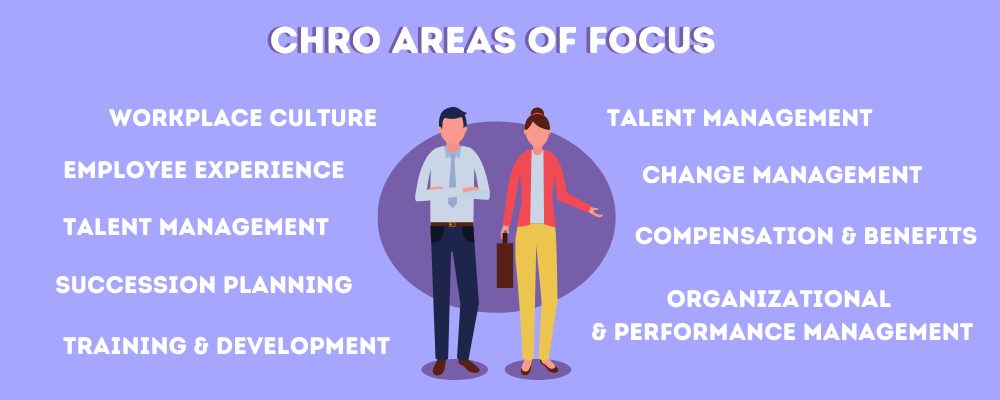If you don’t have a Chief Human Resources Officer you’re behind the curve
There’s another C-suite role in town — the Chief Human Resources Officer (CHRO). Companies know the importance of human resources to the success of their business. The HR department is responsible for hiring, managing employee benefits, ensuring labor law compliance, and a myriad of other responsibilities. Without HR, it would be difficult for a company to thrive.
Unfortunately, there is often a disconnect between the C-Suite executives and the human resources department. In many companies, no consistent representative in the C-Suite represents HR.
That’s where a CHRO steps in.
What is a Chief Human Resources Officer?
This role, also known as a CPO (Chief People Officer), is an executive-level role that represents the HR department within the C-Suite.
Too often, those in the HR department are swamped with their day to day tasks. This makes it challenging for them to take the time to strategize and implement strategies that will lead to better performance in HR. Also, without an executive seat at the table, the interests of HR are often overlooked, which holds the department back from achieving at an optimal level.
You can liken this to a CFO — Chief Financial Officer. Instead of relying on the finance department members solely to handle the high-level strategies, and goal setting representing the interests of finance, a sole member is dedicated to this role. When bringing on a CHRO to your company, you acknowledge the importance of your company’s people, just as much as you recognize the importance of sound financial management in your company by bringing a CFO or other executive on the team.
The role is expansive
The role of a CHRO is vast, but essentially, he or she is responsible for developing and implementing HR strategies. These strategies support the organization’s overall goals but also advance HR-related goals as well.
The Chief Human Resources Officer will communicate the needs of the HR department with the executives in the company and advocate for representation in future planning.
Some areas of focus include:
- Workplace culture
- Employee experience
- Talent management
- Change management
- Succession planning
- Training and development
- Compensation and benefits
- Organizational and performance management
Why your company needs a CHRO
Today, more than ever, there is an understanding that the people in a company matter. Employees want to feel that.
They want a healthy workplace culture, fair compensation and benefits, proper training and development, and more. Placing a C-Level executive representing HR’s goals and tasked with planning to advance HR goals put the employees’ interests higher on the agenda. In addition, acquiring and retaining talent is a necessity for any business to thrive. Dedicating a C-suite role to this ensures the necessary resources are available to do so.
What to look for when hiring
When you’re looking to bring on a CHRO or a CPO to your company, you want to hire a person who has both HR knowledge and experience. They need the leadership, strategic planning, and problem-solving skills needed to succeed in the C-Suite.
Your Chief Human Resources Officer needs to be:
- Practical. The CHRO will need an understanding of HR’s more practical components, such as compliance and payroll process. It’s with this understanding that they can develop strategies to improve all aspects of HR.
- Data-minded. Although HR is focused on the people, data is a critical part of best serving the people. The CHRO will be responsible for gathering data, developing data-based strategies, and measuring the impact of the implemented strategies.
- A strong leader. A CHRO will be responsible for organizational change in the company. That requires a strong leader who can guide the company through those changes.
- A reliable communicator. The CHRO will need to communicate with and persuade other executives from an HR perspective, especially when they disagree on a strategy in place. Their ability to advise CEOs on business decisions with HR in mind is crucial.
- Globally and culturally aware. As the representative of the HR department, having cultural awareness and sensitivity is crucial. This is becoming even more important as we begin to acknowledge the need for diversity, equity, and inclusion in the workplace.
In addition to the skills listed above, a good CHRO will have good collaboration, delegation, relationship management skills.
Additionally, more HR related requirements you might look for in a CHRO or CPO include:
- Work experience as a Chief HR Officer, VP of HR, or similar role.
- In-depth knowledge of all HR functions.
- Hands-on experience with HR software (HRIS, ATS).
- Good understanding of labor legislation.
- BSc/MSc in Human Resources Management, Organizational Psychology or relevant field.
- Certifications such as PHR (Professional in Human Resources) and SPHR (Senior Professional in Human Resources) are also useful additions to bring to the table.
Having a CHRO is crucial moving forward
The people in an organization are and should be the number one priority. That’s why having a C-Suite executive representing the interests, goals, and strategic planning for HR is crucial.
Instead of hiring outside consultants to do the job a CHRO would do, having a full-time in-house person can ensure that the needs of HR are always represented on the executive level, just as a CFO or CMO is present.
Hiring a CHRO or CPO in your company will bring forth more benefits than you can imagine. It will show employees that their interests are represented at all levels of the company from the top down. In the long run, this can also improve employee retention, morale, and overall performance.
Additional Resource: See more on tips for improving employee retention.







